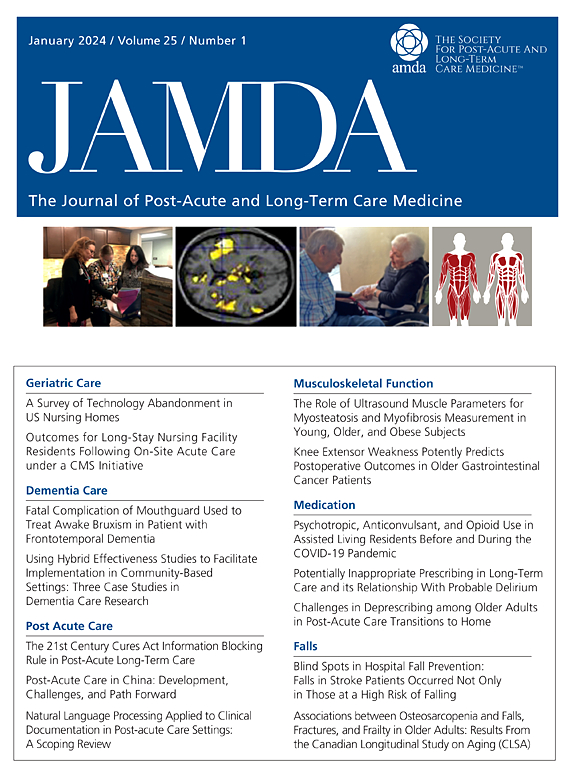Dementia Care Training Interventions for Residential Aged Care Workers: An Umbrella Review
IF 4.2
2区 医学
Q2 GERIATRICS & GERONTOLOGY
Journal of the American Medical Directors Association
Pub Date : 2025-06-05
DOI:10.1016/j.jamda.2025.105627
引用次数: 0
Abstract
Objectives
Staff working in residential aged care (RAC) play a vital role in delivering quality care to residents with dementia. This umbrella review aimed to summarize reviews that examined dementia training interventions for RAC staff and their effects, to inform the development of training for an Australian aged care organization.
Design
Umbrella review.
Settings and participants
RAC workers and older adults with dementia living in RAC.
Methods
An umbrella review was adopted to summarize a wide range of education and training interventions efficiently. A systematic search was conducted to identify systematic, literature, or scoping reviews that adopted a systematic or documented search strategy; included primary studies that assessed training or educational interventions for paid staff in RAC; and focused specifically on dementia care.
Results
Twenty-seven reviews met inclusion criteria. Dementia training for RAC workers included a diverse range of topics, frameworks, or approaches to care. Clinical and direct care staff were the participants of training across most interventions. Core training components focused on (1) managing behavioral and psychological symptoms of dementia, (2) providing person-centered care, and (3) building communication skills. Training was often couched within multifaceted dementia interventions. More successful training extended beyond didactic teaching methods and engaged staff across multiple training sessions. Although a range of staff and resident outcomes were examined, the diversity of outcomes assessed and study designs made it difficult to compare across reviews.
Conclusion and Implications
Given the prevalence of dementia in older people living in RAC, equipping the workforce with the core knowledge and skills in how to care for a person with dementia is vital for the delivery of quality of care and resident quality of life.
老年护理人员痴呆护理培训干预措施综述。
目的:工作人员在住宅老年护理(RAC)发挥至关重要的作用,为老年痴呆症患者提供高质量的护理。本综述旨在总结对RAC工作人员进行痴呆培训干预的综述及其效果,为澳大利亚老年护理组织的培训发展提供信息。设计:伞式审查。环境和参与者:RAC工作人员和居住在RAC的老年痴呆症患者。方法:采用总括性综述,有效总结各种教育培训干预措施。进行系统检索,以确定采用系统或文献检索策略的系统、文献或范围评价;包括评估RAC有薪工作人员的培训或教育干预措施的初步研究;专注于痴呆症护理。结果:27篇综述符合纳入标准。RAC工作人员的痴呆症培训包括各种主题、框架或护理方法。临床和直接护理人员是大多数干预措施的培训参与者。核心培训内容侧重于(1)管理痴呆症的行为和心理症状,(2)提供以人为本的护理,以及(3)建立沟通技巧。培训通常在多方面的痴呆症干预措施中进行。更成功的培训超越了说教式的教学方法,并让员工参与多个培训课程。虽然检查了一系列的工作人员和住院医生的结果,但评估的结果和研究设计的多样性使得很难在审查之间进行比较。结论和意义:考虑到居住在RAC的老年人中痴呆症的患病率,为劳动力配备如何照顾痴呆症患者的核心知识和技能对于提供护理质量和居民生活质量至关重要。
本文章由计算机程序翻译,如有差异,请以英文原文为准。
求助全文
约1分钟内获得全文
求助全文
来源期刊
CiteScore
11.10
自引率
6.60%
发文量
472
审稿时长
44 days
期刊介绍:
JAMDA, the official journal of AMDA - The Society for Post-Acute and Long-Term Care Medicine, is a leading peer-reviewed publication that offers practical information and research geared towards healthcare professionals in the post-acute and long-term care fields. It is also a valuable resource for policy-makers, organizational leaders, educators, and advocates.
The journal provides essential information for various healthcare professionals such as medical directors, attending physicians, nurses, consultant pharmacists, geriatric psychiatrists, nurse practitioners, physician assistants, physical and occupational therapists, social workers, and others involved in providing, overseeing, and promoting quality

 求助内容:
求助内容: 应助结果提醒方式:
应助结果提醒方式:


